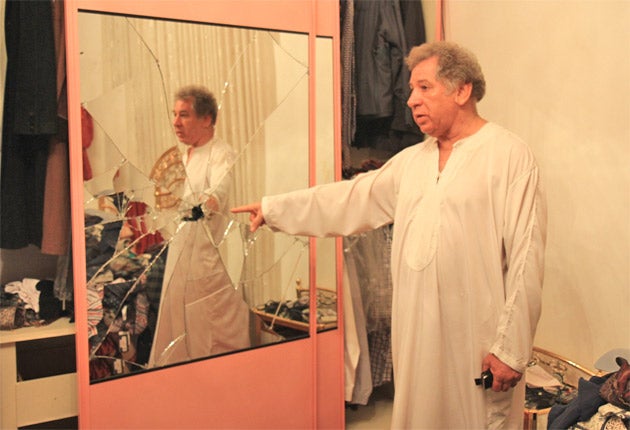Libyans who grew rich in Gaddafi years are now a target

Your support helps us to tell the story
From reproductive rights to climate change to Big Tech, The Independent is on the ground when the story is developing. Whether it's investigating the financials of Elon Musk's pro-Trump PAC or producing our latest documentary, 'The A Word', which shines a light on the American women fighting for reproductive rights, we know how important it is to parse out the facts from the messaging.
At such a critical moment in US history, we need reporters on the ground. Your donation allows us to keep sending journalists to speak to both sides of the story.
The Independent is trusted by Americans across the entire political spectrum. And unlike many other quality news outlets, we choose not to lock Americans out of our reporting and analysis with paywalls. We believe quality journalism should be available to everyone, paid for by those who can afford it.
Your support makes all the difference.When I got into Ahmed al-Hamdi's car, he told me the city was safe. Two hours later, he pulled a loaded pistol from the glove compartment and confessed that he slept with a Kalashnikov by his bed. Tripoli may now be in the hands of the rebel forces, but a dark undercurrent of fear and suspicion still pervades the capital.
Mr Hamdi had recently escaped from Ain Zahra prison, where he'd been held since 2009, spending six months of his stay in solitary confinement. Previously the public-relations manager of a hospital in Benghazi, he was accused of organising an anti-regime political group but was never put on trial.
He wanted to take me to see the homes of former leaders of the Gaddafi regime. In what was once a smart area, burned cars formed barricades blocking the roads with makeshift checkpoints. There were clothes and mattresses strewn in the street and the gates of many of the spacious villas were smashed open. Almost all of the families that once lived in this affluent neighbourhood had fled and rebels had moved in, taking out the last loyalists snipers and looting many of the homes.
Within the grounds of one burned-out house, a young guard lolled against the wall. He wore a rebel flag as a bandanna and a pistol was slotted into the holster attached to his flower-patterned shorts. Giving his name as Mohammed Shukri, 26, he said that a few of the wealthy former regimists had returned to their homes the night before but had been apprehended by the rebels. "We told them if they came back again we would burn their houses," he said.
Mr Hamdi objected and an argument broke out. Mr Hamdi felt that the residents of these houses should be left alone or given a fair trial. "If he didn't do anything bad it is wrong and if he did, then there is the law," he said.
"We have a right," Mr Shukri said. "They shot at us before."
Others clearly took Mr Shukri's view. Further into the area, the former home of Hannibal Gaddafi lay ransacked, a bullet-proofed BMW abandoned in the garage and a dead gazelle rotting on the overgrown lawn. Hannibal's embossed black business cards lay scattered across the bedroom floor.
As we approached the home of Abdullah Senussi, Muammar Gaddafi's brother-in-law and former intelligence chief who is one of the three men named in the International Criminal Court's arrest warrant issued in May, a middle-age man in a white robe ran towards us. "This is my car and this is my house," he said, pointing to a new black Humvee parked nearby, all of its tyres slashed. "I did nothing. I'm supporting the revolution."
Mr Hamdi was sceptical but the man in the white robe, Yousef Shakir, 50, insisted he was a businessman and had nothing to do with Colonel Gaddafi and his regime. He took us in to see his burgled home. Men had come two days earlier and taken three cars, 11 flat-screen televisions and mobile phones.
Broken glass was scattered on the ground of the spacious compound and the water of the swimming pool had turned green but there was relatively little damage to the opulent interior of the house. In a bedroom were three of his four daughters, all of them medical students, as well as his wife and a nephew. The eldest daughter, Helen, 23, wore tight jeans and a short-sleeved shirt. She showed me her empty cupboards. "I have nothing, even my wedding dress, they stole it," she said. Her wedding has been postponed; the gold she had saved for her dowry had been taken as well as her collection of designer dresses. "I cry, I'm afraid, but there's nothing I can do," she said.
Mr Shakir's nephew, Salah Amr Gosbe, 23, had seen the men who raided the house. "I saw rebels from Misrata enter our home," he said. "After that other people entered the house under the protection of the rebels."
Mr Shakir's wife, Fatima, said: "Before, no one could walk in the front door here because Gaddafi protects the area. Now there's no safety. They can rob your house as you are watching them. There's nothing you can do because they have guns."
Join our commenting forum
Join thought-provoking conversations, follow other Independent readers and see their replies
Comments